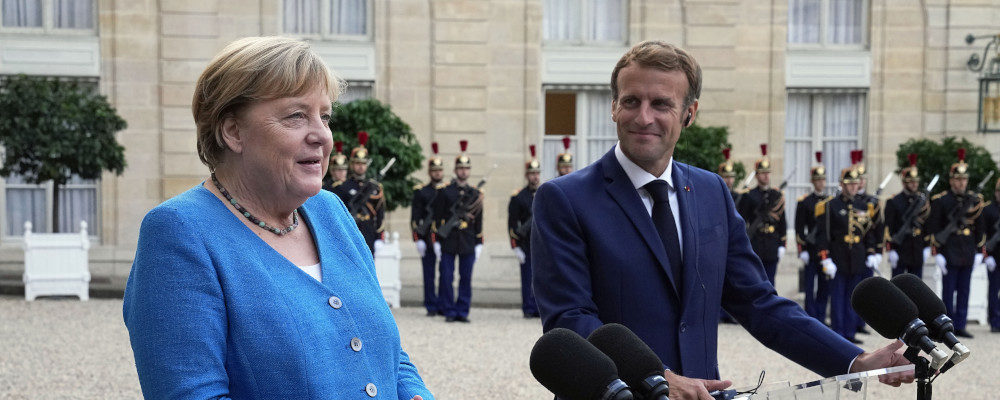On my first visit to Berlin, I remember seeing two portraits, hung side by side, of Angela Merkel. They were taken a decade apart by the photographer Herlinde Koelbl, who has documented Merkel’s career with a photograph and a short interview each year since the early 1990s.
In the first photograph from 1995, Merkel is a young minister of the environment. Her expression is inscrutable, with a hint of a Mona Lisa smile, as though she finds the idea of being photographed faintly amusing. In the second, taken eleven years later, her face is softer, rounder, but her expression is harder. There is no longer any trace of amusement on a face that wears the weight of experience.
It is tempting to see the two photographs not just as personal portraits but as the faces of two Europes.
First, the hopeful face of the years immediately after the fall of the Soviet Union, when the reunification of Germany seemed to coincide with a rebirth of Europe itself and, with it, the long-awaited end of history, to use a then-fashionable phrase. If the European Union of 1995 was not quite the telos of an Enlightenment project that was back on track after being derailed for most of the 20th century, you could at least convince yourself that the happy prospect was just around the corner.
Though only a decade later, the second portrait is from another age. It is the face of a Europe that has shed its illusions and accepted that holding a divided continent together by monetary policy is not something that can ever be finally achieved. It is a face prepared for an endless struggle of incremental progress and long periods of uncertain stasis in which personal will counts for more than optimism. It is the face that the world would come to know as Chancellor Merkel.
As she steps down after more than sixteen years as Chancellor, Angela Merkel’s rise from a research scientist with no political background in her thirties to the dominant figure of modern Europe has lost none of its improbability despite numerous retellings. Her place in German and European history is assured, though quite what that place is remains to be seen.
By comparison with the other great post-war German chancellors, Merkel appears to lack a signature achievement. Konrad Adenauer rebuilt a shattered Germany into a pacifistic powerhouse; Willy Brandt’s Ostpolitik kept Germany at the centre of Europe, with one eye looking west and the other east; and Helmut Kohl oversaw a stunning reunification after the unexpected fall of the Berlin Wall and the collapse of the Soviet Empire.
Merkel has … kept the ship afloat.
She made some serious and avoidable blunders — destabilizing European immigration policy by inviting a million migrants into Germany, for example, and failing to take David Cameron seriously when he told her that the EU’s lack of flexibility on freedom of movement could lead to Brexit — but she survived them untarnished. Remarkably, for a politician who has been in power for so long, she is already being remembered fondly, even wistfully, even before she officially leaves office.
If she lacks a defining policy, that isn’t entirely her fault. The times make great statesmen more often than statesmen make their times great. It was Merkel’s good fortune that Germany was not challenged by an existential threat during her chancellorship. She did not fundamentally change her country, but she did not need to. And when she did face challenges at home or in Europe, she usually managed to hold the line.
If anything, her trademark steadiness belied the difficulty of her job. All the problems of Europe eventually landed on her desk and, on any given day, Merkel had to make decisions that affected the future of nations other than her own.
The Greek financial collapse; financial crises in Italy and Portugal; nationalism in England, Austria, Poland, and Hungary; protectionism in France; a migrant crisis that has never really gone away; unreliable neighbours to the South and hostile neighbours to the East and Southeast—all this was part of Merkel’s political remit, on top of running the fourth largest economy in the world and holding together a country that has not yet fully healed from forty-five years of social and cultural division.
No wonder that face in the second portrait is less hopeful but more resolved. It is the face of a prophet who knows she will not see the promised land because there is no promised land, only work and more work to keep what you have. Now that Merkel had decided to hand that work on to someone else, Europe and much of the world wonders what will come next.
At first glance, last night’s election was a tentative vote for change. Under Merkel’s successor, Armin Laschet, the CDU had its worst result since 1945. Although the CDU and its sister party the CSU at 24.1 percent were only barely behind the social-democratic SPD party at 25.7 percent, the CDU’s fall from grace and the surprising revival of the moribund SPD is a significant development. But change is relative, and in a stubbornly cautious political system like Germany’s, it means less than it would in a Westminster system.
Although it has already been announced that coalition talks will last until Christmas, the most likely new coalition is a so-called “traffic light coalition” led by the SPD (Red) with the centre/centre-right FPD (Yellow) and the Greens (Green). In that case, the presumptive new Chancellor would hardly be a new face.
SPD leader Olaf Scholz has been the German Minister of Finance since 2018 and his party has been in coalition with Merkel’s CDU for twelve of the last sixteen years as part of the so-called Große Koalition. That alone should tell you how different German politics is from Canadian or British politics, let alone the quadrennial Manichean struggle for the American presidency.
If there is a longer-term message in this German election, it is too early to decipher it. It is not clear whether the CDU’s decline is just the result of voter fatigue after so long in power or whether it signals a more permanent fracturing of German politics such that no party can now expect to achieve the decisive pluralities that have been the rule for most of the post-war period.
Germany’s political collapse into anarchy and revolution after the First World War, and the Nazi party’s emergence from the chaos of fifteen chancellors in fifteen years during the Weimar Republic, are never far from the German political mind. For that reason, the succession of stable, centrist post-war coalitions have been at least as important to the country’s psychological balance as they have been for its remarkable economic growth. Merkel’s longevity has been an essential part of that balance.
Merkel’s leadership earned her the somewhat incongruous sobriquet of “Mutti,” or the “mummy” of the German people. In one sense, the name didn’t quite fit. She never sought to coddle or comfort the voters, preferring to treat them like grown-ups and to offer them hard truths and clear choices. But in a much more important sense, her confidence, her steadiness, and even her occasional tough pragmatism, have been more reassuring than the performative displays of empathy we have come to expect from lesser politicians.
Merkel didn’t just represent stability, she was stability. But stability embodied in one person is not a legacy. Merkel may have shielded her country from many of the global threats of the last two decades, but those threats didn’t just go away. With her departure, the futures of Germany and Europe are now less certain.




